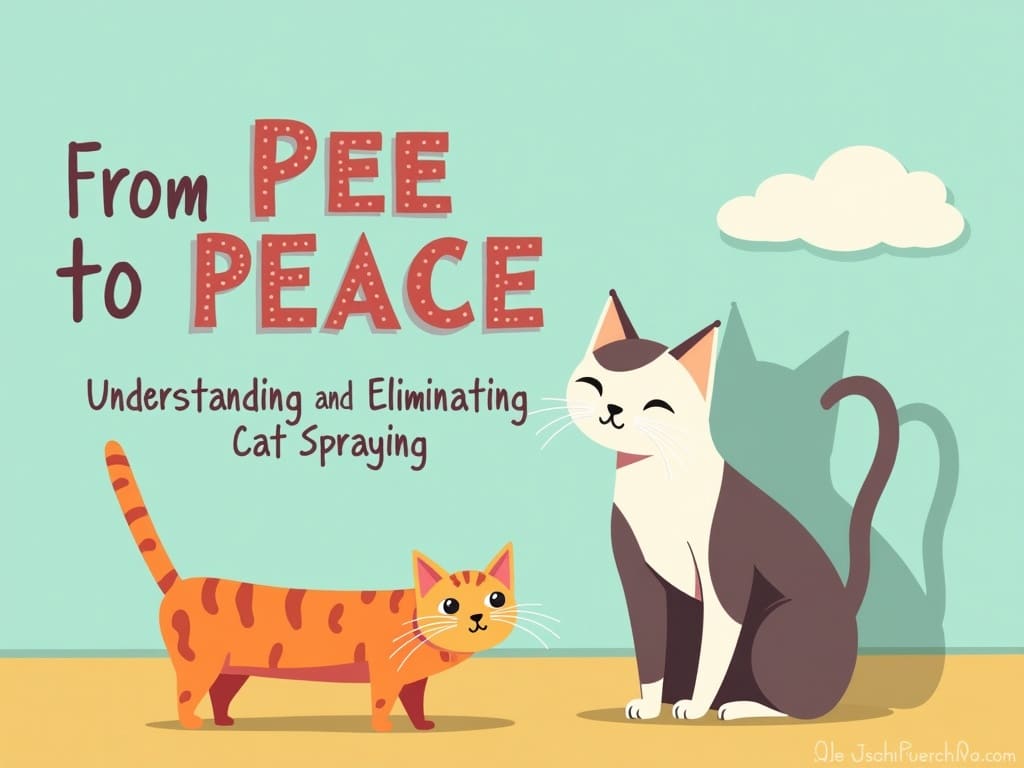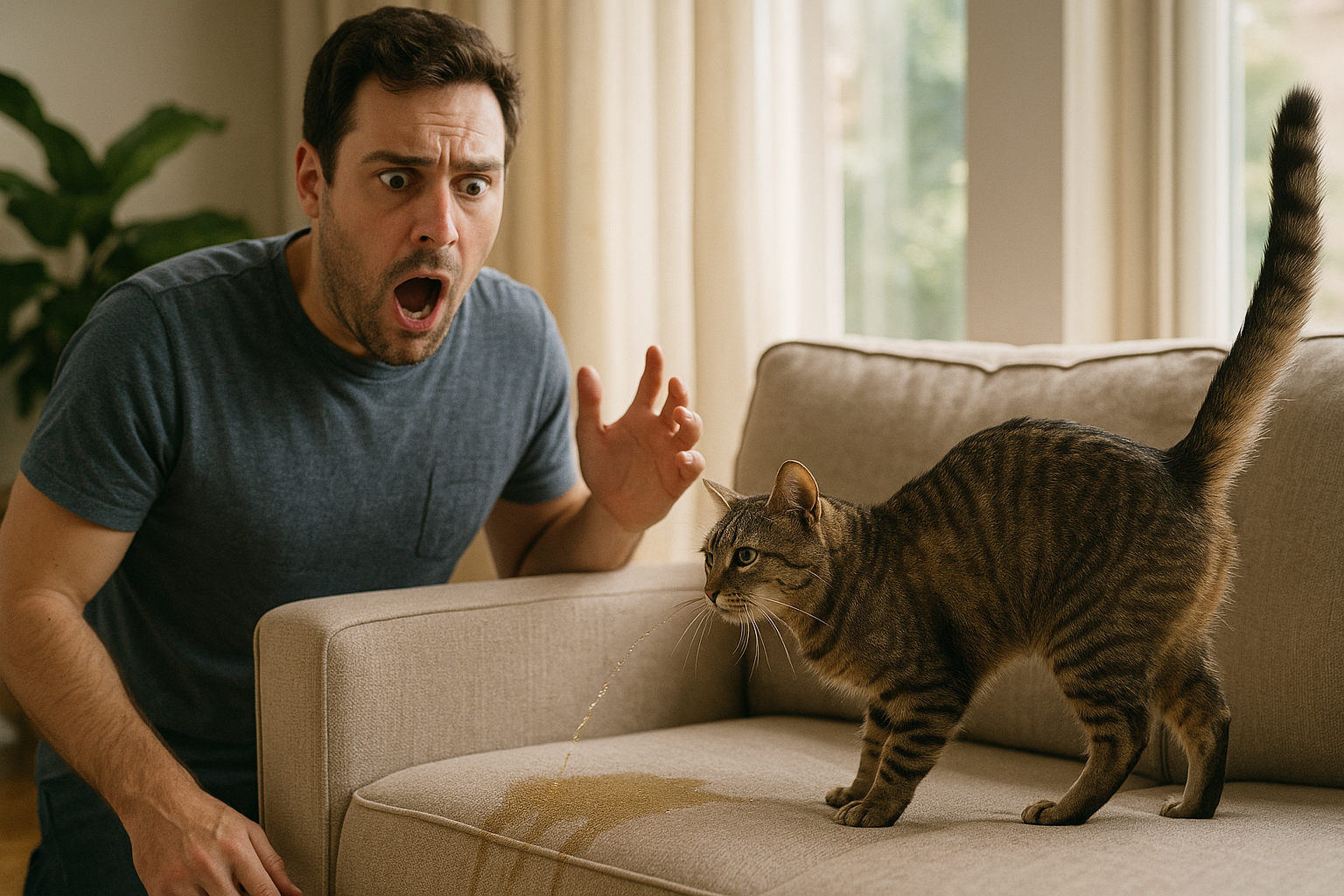Your One-Stop Shop for Everyday Essentials & Unique Finds
From Pee to Peace: Understanding and Eliminating Cat Spraying
Imagine waking up to the pungent, unmistakable odor of cat urine – not in the litter box, but on your curtains, furniture, or even your bed. This isn't just an accident; it's likely cat spraying. While frustrating, understanding the reasons behind this behavior is the first step towards restoring peace (and a fresh scent) to your home. This comprehensive guide delves into the cat spraying causes, offering practical solutions to help you eliminate this problem for good.
What is Cat Spraying and How is it Different from Urination?
Many cat owners mistake spraying for a simple accident. However, there are key differences. Urination is typically a large volume of urine deposited in a horizontal surface, often in the litter box (or, unfortunately, outside of it if there's an issue!). Spraying, on the other hand, is a smaller amount of urine sprayed onto a vertical surface. Your cat will often back up to the object, lift their tail, and quiver as they spray. The purpose isn't just to relieve themselves; it's a form of communication.
Spraying is a cat's way of leaving their signature scent, marking their territory and communicating with other cats. It’s a complex behavior driven by a variety of factors, not just an empty bladder.
What are the Common Cat Spraying Causes, Both Medical and Behavioral?
Pinpointing the exact cat spraying causes can be tricky, as the reasons are varied. They generally fall into two main categories: medical and behavioral.
- Medical Issues: Underlying health problems can sometimes manifest as spraying (or inappropriate urination).
- Behavioral Issues: These are far more common and are usually linked to stress, anxiety, or territoriality.
Let's explore these in more detail.
How Can Stress and Anxiety Trigger Spraying in Cats?
Cats are creatures of habit, and even small changes can cause significant stress. Stress and anxiety can be major cat spraying causes. Stressors can include:
- Moving to a new home
- Changes in the household routine
- The introduction of a new pet or person
- Loud noises or construction
- Feeling threatened by outdoor cats
When a cat feels insecure or threatened, they may spray to reassure themselves by reinforcing their scent in their environment.
What is the Role of Territory and Marking in Cat Spraying Behavior?
Territory is paramount for cats. Spraying is a key way they define and defend their space. The urine acts as a biological No Trespassing sign to other cats, signaling ownership and dominance. Even indoor cats spraying can stem from a perceived territorial threat, often from outdoor cats they see through windows.
Could Changes in the Home Environment (New Furniture, People, Pets) Lead to Cat Spraying?
Absolutely. Cats are highly sensitive to changes in their environment. A new sofa, a visitor staying for an extended period, or the arrival of a new pet can all disrupt a cat's sense of security and trigger spraying. These changes represent potential threats to their established territory and routine.
What are the Medical Reasons to Rule Out Like Urinary Tract Infections?
It's crucial to rule out medical issues before assuming the spraying is purely behavioral. Conditions like urinary tract infections (UTIs), bladder stones, feline idiopathic cystitis (FIC), and kidney disease can cause discomfort and pain, leading a cat to associate the litter box with negative experiences. This can cause them to avoid the litter box and urinate in other places. A vet visit is essential for diagnosis and treatment.
How to Stop Cat Spraying: Practical Solutions
Now that we've covered the causes, let's dive into practical solutions to stop cat spraying.
How to Clean Cat Spray Effectively to Remove Odor and Prevent Re-Marking?
Proper cleaning is paramount. Regular household cleaners often mask the odor to humans but don't eliminate it for cats. This means your cat will likely return to spray the same spot. Use an enzymatic cleaner specifically designed for pet urine. These cleaners break down the uric acid crystals in the urine, eliminating the odor completely. Follow these steps:
- Blot up as much urine as possible with paper towels.
- Saturate the area with the enzymatic cleaner.
- Let it sit for the time recommended on the product label.
- Blot up the excess cleaner.
- Allow the area to air dry completely.
For fabrics, test the cleaner on an inconspicuous area first to ensure it doesn't cause discoloration.

What are the Best Cat Spraying Deterrents, Including Sprays, Devices, and Techniques?
Several deterrents can discourage spraying:
- Scent Deterrents: Cats dislike certain scents, such as citrus, lavender, and peppermint. You can use essential oils (diluted properly) or commercially available cat repellent sprays with these scents.
- Motion-Activated Sprays: These devices release a harmless burst of air when a cat approaches, startling them away from the area.
- Physical Barriers: Cover previously sprayed areas with aluminum foil, plastic sheeting, or double-sided tape. Cats dislike the feel of these surfaces under their paws.
What is the Role of Environmental Enrichment (Toys, Scratching Posts, Vertical Space) in Preventing Spraying?
A stimulating environment can significantly reduce stress and boredom, which are major cat spraying causes. Provide:
- Plenty of Toys: Rotate toys regularly to keep your cat engaged.
- Scratching Posts: Scratching is a natural behavior that helps cats relieve stress and mark their territory in a positive way.
- Vertical Space: Cats feel safer and more secure when they have access to high places, like cat trees or shelves.
How Can You Reduce Stress in a Multi-Cat Household to Prevent Spraying?
Multi-cat households can be a breeding ground for stress. To minimize conflict and spraying:
- Provide plenty of resources: Each cat should have their own food and water bowls, litter boxes, scratching posts, and beds.
- Ensure resources are spread out: Don't cluster all the resources in one area, as this can create competition.
- Use pheromone diffusers: Synthetic feline pheromones can help reduce anxiety and create a more harmonious environment.
- Play with each cat individually: This helps strengthen your bond with each cat and reduces feelings of competition.
What Kind of Behavior Modification Techniques and Training are Effective for Spraying?
Behavior modification techniques, often in conjunction with other strategies, can be highly effective:
- Positive Reinforcement: Reward your cat with treats or praise when they use the litter box or engage in positive behaviors.
- Redirection: If you catch your cat about to spray, distract them with a toy or a loud noise.
- Consult a veterinary behaviorist: For severe cases consult an expert. They can help you identify the underlying causes of spraying and develop a tailored behavior modification plan.
How Does Neutering or Spaying Affect Cat Spraying Behavior?
Neutering or spaying is crucial! It significantly reduces or eliminates spraying in most cats, especially when done before they reach sexual maturity. These procedures reduce the production of hormones that drive territorial behavior.
What are the Common Myths and Misconceptions About Cat Spraying?
Let's debunk some common myths:
- Myth: Cats spray out of spite. Reality: Spraying is a communication behavior, not an act of revenge.
- Myth: Only male cats spray. Reality: Female cats can spray too, although it's less common.
- Myth: Punishing your cat will stop the spraying. Reality: Punishment will only increase your cat's stress and anxiety, making the problem worse.
What are the Long-Term Effects if Cat Spraying is Left Untreated?
Ignoring cat spraying can have several negative consequences:
- Escalation of the behavior: Spraying can become more frequent and widespread.
- Damage to your home: Urine can damage furniture, carpets, and walls.
- Strained relationship with your cat: Frustration and resentment can build up, negatively impacting your bond.
- Your cat can become an outcast and be ostracized from your home, losing a vital safe place.
Key Takeaways and the Ultimate Summary of How to Stop Cat Spraying
Stopping cat spraying requires a multi-faceted approach:
- Rule out medical causes.
- Clean sprayed areas thoroughly with an enzymatic cleaner.
- Reduce stress and anxiety.
- Provide ample environmental enrichment.
- Use deterrents.
- Consider behavior modification techniques.
- Neutering/spaying helps tremendously.
Patience and consistency are vital. It may take time to identify the cat spraying causes and find the right combination of strategies that works for your cat. Don't give up! With understanding and dedication, you can eliminate cat spraying and restore peace to your home. You may wish to receive regular tips directly to your inbox! Check out this link for more information: Stop Cat Spray













Leave a comment